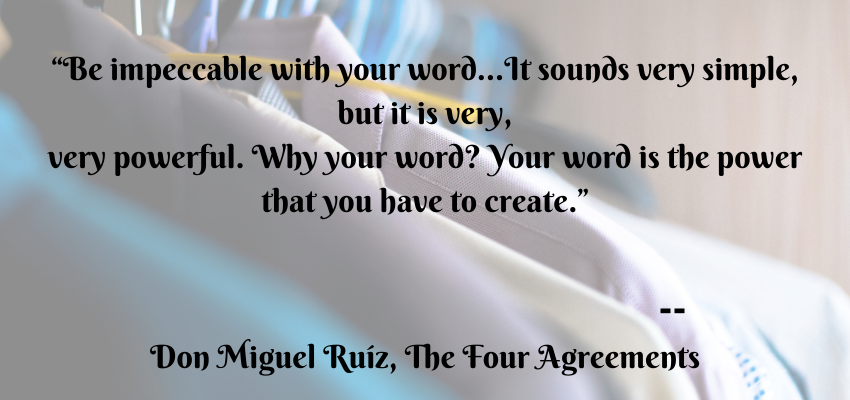By Darius E. Bennett, Esq.

In his acclaimed “practical guide to personal freedom,” don Miguel Ruíz advises, “Being impeccable with your word is not using the word against yourself.” The idea is to speak words that represent who you are, understanding that you are responsible for how your words ramify. If you gossip about a colleague, that colleague may seek to ruin your career or disrupt your work environment. Others who are aware of your gossiping, may trust you less or receive you poorly. Conversely, if you approach joint projects with collaborative language that edifies your partner’s contributions, you will likely create conditions inviting others to work with you respectfully.
When we were children, my mother often recited to her four sons, “When a task has first begun, be it great, be it small, do it well or not at all.” On occasion she tasked the three older boys with re-organizing the closet containing clothes for church or special occasions, and asked us to “hang them nicely.” She provided very specific instructions for how that looked. In fact, she demonstrated patiently and carefully what her expectations were with a sample of each item: A coat should be hung on a sturdy hanger, tucking the support rods of the hanger into the shoulders of the coat such that, when later used, the coat did not come off the hanger misshapen. Pants were to be carefully flattened along their side seams (to avoid unnecessary wrinkling and to preserve the creases pressed in by the cleaners), and then folded over a hanger affixed with paper or cloth, to prevent the pants from sliding off the hanger, down to the floor. Later, my mother would inspect our work, and would remove each item improperly hung so that we could re-hang them. As she dismantled our shoddy performances, her words were corrective but not censuring. She indicated how we had underperformed, showing us our errors. She then repeated, “When a task has first begun,” and we joined in chorus, suppressing tears as we viewed the newly formed heap of clothes, “be it great or be it small, do it well, or not at all.” I will admit that, for us kids, starting over felt unnecessary.
However, as an adult I eventually understood that the first principle was to do our absolute best, the first time. The second and most important principle, from a parenting perspective, was modeling the impeccability of her word. If my mother had not lovingly enforced the principle of “when-a-task,” she and my father could not have created the structure necessary to form relatively decent human beings. Through the behavior she modeled, we learned to set high standards, to honor those standards, and to correct with love. I took those lessons to heart, and would later approach professional work and even friendships with the same punctiliousness. And the love?
I struggled to pay for law school alone, and was helped. I promised those friends who helped that I would work hard and remove their financial obligation as soon as I could. Lovingly, they each dismissed my pledge and assured me with some version of, “I trust you. I am not worried about this.” When I graduated law school, I set about the task of finding work and honoring my word. Two months after sitting the bar, I accepted the first Associate Attorney position I was offered, and began to restore my credit worthiness. Within the first year, I was able to free each of them from their respective loan obligations. I then committed to leaving that job after the first two years, but was not equally impeccable with my word. I lost my way, and became focused on wealth. To be honest, I did not always correct others with the same respect and kindness I had once received, although I was gratingly fastidious. The consequence was that I toiled away at that job for six years, miserably. I had forgotten to speak words that represented who I was. I became subsumed under the weight of my ego, and created conditions for me to become an island unto myself.
Eventually I re-awakened to the lesson that words have power and consequences, and I have spent the past several years committed to words that build instead of destroy.

